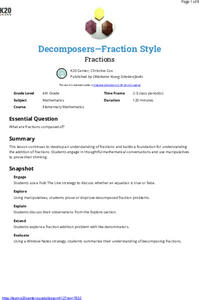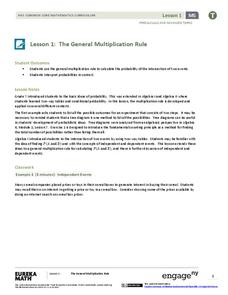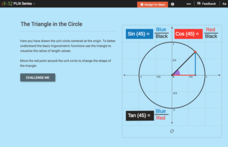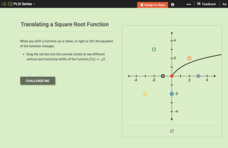West Contra Costa Unified School District
Division (No Remainders)
Help young mathematicians build a solid understanding of division with this base ten block activity. With the help of these popular math manipulatives, children model different math problems in order to reinforce the connection between...
BW Walch
Linear & Exponential Functions
Positioned inside the framework of linear and exponential functions, this lesson is more of an investigation into the effects of changing variables and constants inside an expression. The author takes familiar formulas, those for...
National Security Agency
Awesome Area - Geometry and Measurement
Break out those math manipulatives, it's time to teach about area! Capturing the engagement of young mathematicians, this three-instructional activity series supports children with learning how to measure the area of squares, rectangles,...
Mathematics Vision Project
Circles and Other Conics
Through a variety of hands-on activities and physical scenarios, this far-reaching unit leads learners through an exceptionally thorough exploration of circles and parabolas as conic sections. Geometric construction techniques are used...
K20 LEARN
Building To 100: Building And Decomposing Numbers
Following a catchy video about decomposing numbers, young mathematicians build and write numbers using dice. Class members work to create an anchor chart that displays six ways to make numbers. Beans get scooped and estimated, then...
CK-12 Foundation
Simplify Products or Quotients of Single Variable Expressions: Circling C's
Model expression division using online manipulatives. Learners drag C's representing a term into equal groups. Guiding questions help them see their groups as the division of the term.
K20 LEARN
Decomposers—Fraction Style: Fractions
"What are fractions composed of?" is the essential question of a lesson designed to enhance understanding and strengthen the foundation of adding fractions. Mathematicians start by discussing what makes an equation true or false, then...
EngageNY
Solving Exponential Equations
Use the resource to teach methods for solving exponential equations. Scholars solve exponential equations using logarithms in the twenty-fifth installment of a 35-part module. Equations of the form ab^(ct) = d and f(x) = g(x) are...
EngageNY
The General Multiplication Rule
In the first installment of a 21-part module, scholars build on previous understandings of probability to develop the multiplication rule for independent and dependent events. They use the rule to solve contextual problems.
Rational Number Project
Rational Number Project: Initial Fraction Ideas
Deepen the fractional number sense of young learners with this introductory lesson on equivalent fractions. After completing a short warm-up activity, children go on to work in pairs using fraction circles to complete a table of...
Rational Number Project
Initial Fraction Ideas Lesson 18: Overview
Develop young mathematicians' ability to compare fractions with investigation into the number 1/2. After brainstorming a list of fractions equivalent to 1/2, children identify a pattern in the numerators and denominators that allows them...
West Contra Costa Unified School District
Multiplying Binomials and Factoring Trinomials
Two lessons for the price of one! Learners use algebra tiles to multiply binomials in the first lesson, Next, they use their knowledge from the first lesson to factor trinomials into two binomials.
CK-12 Foundation
Trigonometric Functions and Angles of Rotation: The Triangle in the Circle
Go around the unit circle and create triangles. Pupils move a point around the unit circles to visualize the triangle associated with the angle in standard position. The three main trigonometric functions are defined in terms of the legs...
CK-12 Foundation
Vertical Translations: Translating a Square Root Function
How does the equation of a function reflect translations? Scholars manipulate the starting point of the parent square root function before determining the new equations that result from the translations. Class members also determine the...
CK-12 Foundation
Addition of Polynomials: Splitting into Tiles
Count on tiles to add polynomials. Pupils drag virtual algebra tiles onto colored mats to represent the sum of two polynomials. The learners count the number of like tiles to find the coefficient of each term. They finish by discussing...
CK-12 Foundation
Mutually Inclusive Events: Flower Beds at the Community Garden
What color does your garden grow? Learners manipulate the number of flowers of two colors in two garden plots. They determine the probabilities of choosing a particular color of a flower in a given plot. Scholars find the relationship of...
CK-12 Foundation
Fundamental Counting Principle with and without Repetition: Outfit Combinations
But I have nothing to wear! Using an interactive, individuals create all possible outfits from three shirts, one belt, and two pairs of pants. Answering a set of challenge questions helps them see what they have learned from the experience.
CK-12 Foundation
Simplify Sums or Differences of Single Variable Expressions: Addition and Subtraction of Like Terms
Investigate the process of combining like terms using an interactive animation. Scholars tackle simplifying expressions by manipulating rectangles that represent the terms. They add and subtract terms to arrive at the result.
CK-12 Foundation
Function Rules for Input-Output Tables: Soda Sugar Function Table
Examine the relationship between the input and output variables in a table of values. As learners build an input-output table using online manipulatives, they begin to identify patterns. They answer questions about these patterns and...
CK-12 Foundation
Even and Odd Functions and Function Symmetry: Even and Odd Functions (Symmetry)
Even money states that the resource is good to use. Scholars manipulate an interactive to adjust the portion of a graph to the left of the y-axis. The interactive allows them to switch between even and odd modes that show the right side...
CK-12 Foundation
Inverse Functions: Definition of Inverse Functions
Is the inverse of a function also a function? Pupils manipulate the graph of a function to view its inverse to answer this question. Using a horizontal and vertical line, class members determine whether the initial function is...
CK-12 Foundation
Limit of a Sequence: Finding the Limit of a Sequence (Part 3)
Limit the view of sequences on both sides of the axis. Learners explore an alternating sign sequence. Using a graphical display of the first 10 terms of the sequence, pupils determine the formula for the general term. they then use the...
Alabama Learning Exchange
Triangle Congruence with Rigid Motion
Combine transformations and triangle congruence in a single lesson plan. Scholars learn to view congruent triangles as a rigid transformation. Using triangle congruence criteria, learners identify congruent triangles and the rigid...
BW Walch
Creating and Graphing Exponential Equations
Frequently found in biology and economic application problems, exponential equations show up as stars in this introductory presentation. Taking no background or knowledge of exponentials for granted, the slides walk learners through the...

























